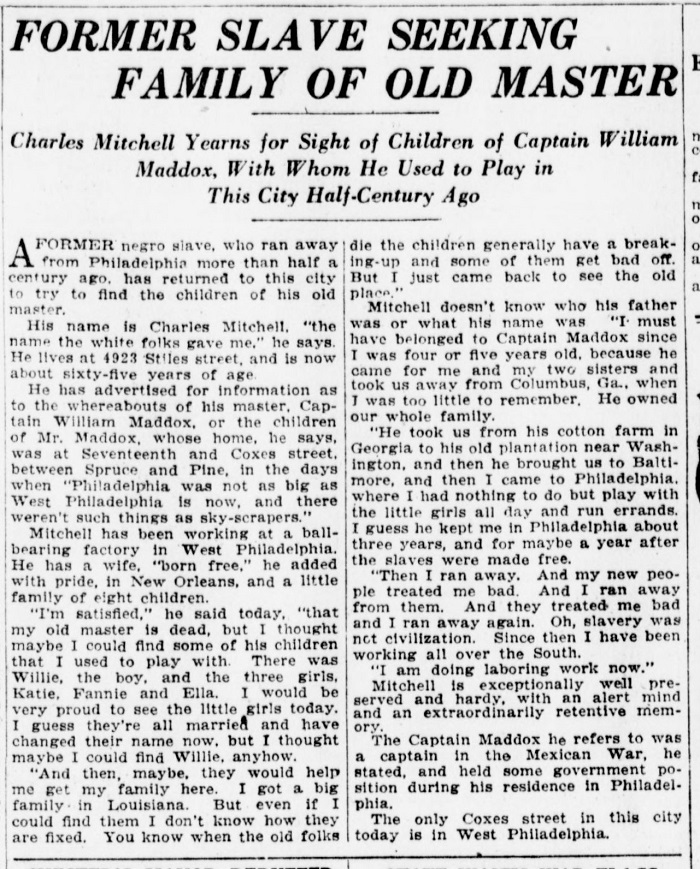News Item, February 10, 1919

Text of news article:
FORMER SLAVE SEEKING FAMILY OF OLD MASTER
Charles Mitchell Yearns for Sight of Children of Captain William Maddox, With Whom He Used to Play in This City Half-Century Ago
A FORMER negro slave, who ran away from Philadelphia more than half a century ago, has returned to this city to try to find the children of his old master.
His name is Charles Mitchell, "the name the white folks gave me," he says. He lives at 4923 Stiles street, and is now about sixty-five years of age.
He has advertised for information as to the whereabouts of his master, Captain William Maddox, or the children of Mr. Maddox, whose home, he says, was at Seventeenth and Coxes street, between Spruce and Pine, in the days when "Philadelphia was not as big as West Philadelphia is now, and there weren't such things as sky-scrapers."
Mitchell has been working at a ball-bearing factory in West Philadelphia. He has a wife, "born free," he added with pride, in New Orleans, and a little family of eight children.
"I'm satisfied," he said today, "that my old master is dead, but I thought maybe I could find some of his children that I used to play with. There was Willie, the boy, and the three girls, Katie, Fannie and Ella. I would be very proud to see the little girls today. I guess they're all married and have changed their name now, but I thought maybe I could find Willie, anyhow.
"And then, maybe, they would help me get my family here. I got a big family in Louisiana. But even if I could find them I don't know how they are fixed. You know when the old folks die the children generally have a breaking-up and some of them get bad off. But I just came back to see the old place."
Mitchell doesn't knwo who his father was or what his name was. "I must have belonged to Captain Maddox since I was four or five years old, because he came for me and my two sisters and took us away from Columbus, Ga., when I was too little to remember. He owned our whole family.
"He took us from his cotton farm in Georgia to his old plantation near Washington, and then he brought us to Baltimore, and then I came to Philadelphia, where I had nothing to do but play with the little girls all day and run errands. I guess he kept me in Philadelphia about three years, and for maybe a year after the slaves were made free.
"Then I ran away. And my new people treated me bad. And I ran away from them. And they treateed me bad and I ran away again. Oh, slavery was not civilization. Since then I have been working all over the South.
"I am doing laboring work now."
Mitchell is exceptionally well preserved and hardy, with an alert mind and an extraordinarily retentive memory.
The Captain Maddox he refers to was a captain in the Mexican War, he stated, and held some government position during his residence in Philadelphia.
The only Coxes street in this city today in in West Philadelphia.
Sources:
Evening Public Ledger, Philadelphia, PA, 10 February 1919, Night Edition, p. 4..
More Information:
It is likely that the former enslaver Charles Mitchell was searching for was Captain William Alfred Truman Maddox, 1814-1889, who served in the US Marine Corps and fought in the Creek and Seminole wars, then in numerous engagements in the War with Mexico. Captain Maddox was born in Charles County, Maryland. His career took him to Washington, DC, which fits with the story above. In addition, Captain Maddox had three daughters and a son: Ella (born 1852), William (born 1854), Kate (born 1857) and Frances (born 1861). Charles was born about 1854, making him about the same age as William. He believes he was purchased from the plantation in Georgia at about four or five years of age, or about 1858 or 1859. Captain Maddox's wife Sarah died in 1861, so Charles' importance as a playmate for the children was invaluable. By the time of Charles Mitchell's trip back to Philadelphia, only Ella and Frances were still alive.
With regard to the Georgia and Philadelphia connections and timeline, his wife Sarah Moughan was born in Georgia. According to genealogical sources, she died in Philadelphia in 1861. Captain Maddox's son William also has Philadelphia connections, having studied medicine in that city and had a medical practice there for several years.
|

